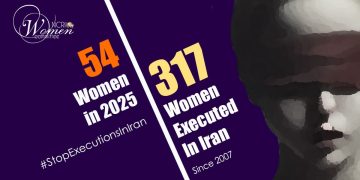Memoirs of Mehri Hajinejad from “The Last Laughter of Leila”— Part Nine
In the previous part, we read about how the women in Evin found small ways to keep their spirit of resistance alive in the middle of isolation and surveillance, from sharing stories and memories to creating tiny moments of joy for the newcomers who entered their ward frightened and exhausted. Mehri Hajinejad described how even the smallest acts of solidarity, like comforting a stranger or spreading a bit of warmth in a cold cell, became a quiet form of resistance.
In this new section of her memoir, she turns to another channel of survival and defiance: the short letters, only five to seven lines, that they were suddenly allowed to send to the outside world in 1982. These brief notes became far more than communication with family; they carried the stamp of their resilience, their coded loyalties, and their unwavering commitment to their fallen loved ones and imprisoned comrades.
The Five–Seven Line Letters
In 1983, when the guards finally had less work on their hands compared to the chaos of 1981–82, they decided to give us paper for writing letters. Until then, we had neither paper nor pens. If a pen existed in a room, it was used with extreme caution so the ink wouldn’t run out.
Their goal was twofold: they needed to appease the families, especially those who had gone two years without a single visit, and they hoped that allowing letters would redirect prisoners’ minds toward family concerns rather than political commitment.
The first day they handed out a few sheets of paper and some pens, we were thrilled. We could finally write notes to our friends downstairs, crumple them into little balls, and throw them through the window. We also hid a few pens “for emergencies.”
Then we sat down and said, “Now what? How do we write a whole letter in five lines?”
Everyone sat around the room quietly, thinking. But silence never suited us. No one was ever alone or withdrawn in our ward, so this stillness felt strange.
It didn’t last long. Suddenly Zahra burst out:
“What on earth are we supposed to write in just a few lines? And why is everyone so quiet? I’m sick of this silence!”
She walked into the middle of the room. I joined her, agreeing that she was right, we needed to think about what message we wanted to send.
Soon everyone was talking and laughing.
One girl said she wanted to draw the whole room and send it instead of a photo.
Another joked she’d write a “Prison Dictionary” so they could turn it into a book outside.
Someone else suggested we write one letter and all of us copy it word for word.
Eventually, we decided that even with only five lines, we would send our joy, our strength, and the reality of prison life to the outside.
Writing the First Letter
My first letter was written in a way that my mother, with help from my sister, could rewrite and deliver to my brother, Ali, imprisoned in Gohardasht.
I began with: “In the name of God, the Ahad (One) and the Samad (Eternal),[1] who is unmatched, self-sufficient, and steadfast. My only dear one, I long to see you so much…
My dear mother, please tell my uncle that I have never forgotten the prayer he taught me, and I always recite it during my prayers: ‘Peace be upon you for the patience you endured; how excellent is the final home…’”
By beginning this letter with the name of the Ahad and Samad God, I wanted all my family to know that I remain faithful to the path of my executed brothers, Ahad and Samad.
I wrote “my only dear one” so my brother in Gohardasht would understand that our other two brothers had already been executed.
Back then we referred to Massoud Rajavi[2] using the code word “uncle.” So, I told my mother to give him my message and say that we remain steadfast.
I was satisfied with the letter because a note without the spirit of the prison wasn’t a real letter. And if I didn’t express this, what would my mother, who had given her entire life to this cause, think? How else would she hold on to hope?
A Comrade’s Request
Minoo, one of my cellmates who was a Marxist, liked the letter so much she asked me to help write one for the family of her husband, who had been killed during the Jungle clashes in February 1982.
After that, every month when we were permitted to write letters, we sent our messages out with the same spirit and resolve.
Of course, many letters never reached their families. We later discovered that any letter containing a Quran verse or a line from Nahj al-Balagha[3] was confiscated, because the guards claimed they were “codes.”
Letters Carried Our Spirit of Resistance
Contrary to what the regime intended, these letters did not increase our longing or sadness. They strengthened us. They brought out our fighting spirit.
Through these letters, I even sent a note to the sister of my sister-in-law Ashraf Mousavi, who was later hanged during the 1988 massacre. At the time she was imprisoned in Qezel Hesar. She had no visitors, so I wrote to tell her that Akram (her sister) had left Iran and that Nasrin, my niece, was living with my mother.
One day, a letter arrived addressed to my sister but clearly written for me. I instantly recognized Ali’s style, my brother writing from Gohardasht, with my mother rewriting it so it would pass inspection.
A Collective Joy
When letters from our families arrived, the entire ward came alive. Joy spread through all six rooms, everyone read everyone’s letters. No letter belonged to a single person; happiness and grief belonged to all of us.
I always rushed to Room 3 to ask Farzaneh if there was a new photo of her niece Fatemeh. She was the sister of Afsaneh Afzalnia,[4] a student organizer who had been executed. Because of my affection for Afsaneh, I loved seeing photos of her little girl who lived with her grandmother in Mashhad.
We even made a little photo album for Fatemeh, using scraps of plastic and cardboard. Farzaneh, who had beautiful handwriting, wrote poems around the pictures.
In the end, letter-writing itself became a collective act among us.
And once again, the guards’ plan backfired; they tried to break us, but even in five lines, we found a way to stay unbreakable.
[1] Ahad (one) and Samad (eternal) are two of the adjectives for God but were also the names of my brothers who had been executed by the regime.
[2] Massoud Rajavi was the then Secretary General of the PMOI/MEK and the charismatic leader of the organization.
[3] Nahj al-Balagha (Path of Eloquence) is a revered collection of sermons, letters, and sayings attributed to Imam Ali, the first Shia Imam. Compiled in the 10th century by Sharif al-Radi, it is considered one of the most important works of classical Arabic literature and a key text in Shia religious and ethical thought.
[4] Afsaneh Afzal-Nia was a heroic member of the PMOI, a sociology student, and one of the organization’s student-affairs coordinators. She was killed on February 9, 1982, at the age of 26, by agents of the clerical regime. She left behind a young daughter named Fatemeh.
























